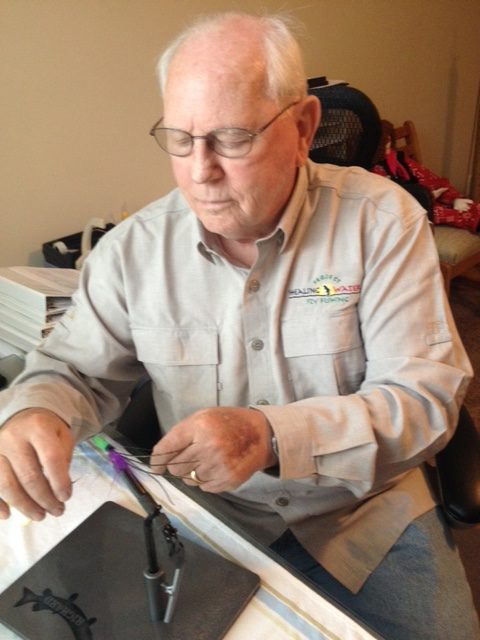By Fred Woods
Editor
Project Healing Waters Fly Fishing, Inc. (PHWFF), is dedicated to the physical and emotional rehabilitation of disabled veterans and active military personnel through fly fishing and associated activities. What PHWFF actually does is teach disabled veterans and active duty personnel how to fly fish and then take them fishing.
PHWFF began in 2005 serving wounded military service members returning from combat in Iraq and Afghanistan at Walter Reed Army Medical Center. Since then the program has spread nationwide, with over 200 programs at Department of Defense hospitals, Wounded Warrior Transition Units and Veterans’ (VA) hospitals.
There are three programs in Alabama: Birmingham, Huntsville and Mobile. None of these are very convenient to the Auburn-Opelika area, so when Richard Pike, a disabled veteran and a PHWFF participant himself, moved here from Colorado a couple of years ago, he thought, “Hey, here’s the opportunity for me to do something for my fellow veterans.”
So Pike, a 76 year old retired army Sergeant First Class, set out to organize a Project Healing Waters Program in our area, an undertaking made more difficult by the fact that fly fishing is not common in the southeast. Pike first contacted the national PHWFF and received authorization to establish a program in this area. Since the program is volunteer-driven, one of the biggest jobs of a Program Lead, as Pike and his fellow program organizer/leaders are called, is to recruit volunteers.
For a lot of us, fly fishing is one of those things we’ve always wanted to try, but never had the opportunity to learn. PHWFF volunteers don’t have to know how to fly fish, at least at first. Richard Pike will teach you. So volunteering for the various PHWFF program activities affords the opportunity to learn how to fly fish.
Pike, as a Program Lead, in addition to recruiting and managing volunteers, administers the fly fishing program in accordance with guidelines from the national office of PHWFF and DoD/VA. Program activities include fly fishing instruction, fly-tying classes, fly casting workshops, rod building and fly fishing outings which may be day-trips or two or three day outings.
Fly fishing in Alabama? Most of us probably thought maybe there was a little fly fishing up in the northeast Alabama “mountains,” but not around here. Wrong! Not only does Drew Morgan have a fly fishing guide business known as East Alabama Fly Fishing, but Pike has partnered with the Auburn University Fly Fishing Club.
Both Morgan and the club have been extremely helpful to Pike’s organizational efforts. Pike, who takes clients on fly fishing float trips down the Tallapoosa River, among other things, recently staged a “Tallapoosa River Bass Blast” which raised $1,110 for the local PHWFF program. The club is the source of Pike’s initial volunteers.
Richard made contacts with VA hospital administration in Tuskegee and a few weeks ago, in mid-May, held his first demonstration class with about 25 attendees at the VA site. He thinks that out of this will come maybe five program participants who will actually “wet a fly.”
He is looking into using the Auburn University Fisheries Department ponds for the local PHWFF program. The program practices catch and release fishing.
As you may have gathered by now, fly fishing is not limited to trout and mountain streams. One can fly fish for most any species of fish in most any body of water, from farm ponds to the seven seas.
In addition to being volunteer-driven, PHWFF is also dependent on donations as well as grants and limited government funding. Project Healing Waters Fly Fishing is a 501(c)(3) non-profit organization and all contributions are tax-deductible.
This past year, nationally, 3,516 program volunteers contributed more than 200,000 hours of service time to offer 3,460 fly tying classes, 944 rod building classes, 1,082 casting classes and 1,316 fishing outings. In 2015 PHWFF served 7,424 injured and disabled military service personnel and disabled veterans.
For more information about the national PHWFF project, go to www.projecthealingwaters.org. For more information about the PHWFF in the Opelika-Auburn area, contact Richard Pike at richard.pike@projecthealingwaters.org or by telephone at (256) 502-3336 or (256) 653-5059.

